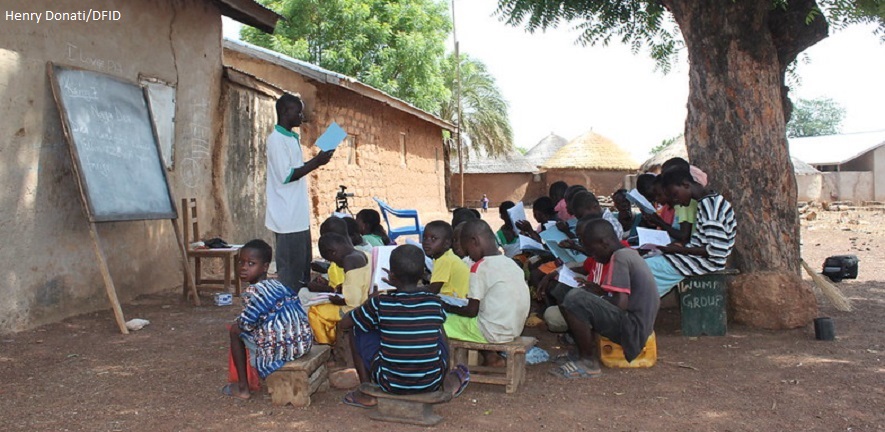Understanding the impact of Complementary Basic education in Ghana
Project summary
This project aims to provide evidence to inform the Government of Ghana’s understanding of the factors that enable children’s learning in the most disadvantaged northern region of the country. The project evaluates the Complementary Basic Education (CBE) programme in terms of improving children’s literacy and numeracy as well as enabling a sustained transition into the public school system.
From 2012 to November 2018 the UK and US Governments provided £27.9 million to support the Government of Ghana to:
i. ensure that 200,000 out-of-school children have access to CBE, with a focus on girls in particular;
ii. build the capacity of government to make CBE a sustainable approach to achieving universal primary enrolment;
iii. provide evidence on the long-term outcomes for out-of-school children that participate in CBE programmes and the barriers and sustainability of the programme.
To achieve these goals, a CBE Management Unit (MU) was established. Its aims are to provide technical support to 10 NGOs who were sub-contracted to implement CBE at district level, and support the Ministry of Education and the Ghana Education Service to make CBE an integral part of the strategy to improve access and learning. The CBE programme operates in 5 regions and 44 districts in the northern part of Ghana.
The team is tracking a cohort of children currently involved in the CBE programme for 2 years. During this time, these children should complete the full 9 months’ accelerated learning of the CBE programme, should have a transition into public education and should also complete one additional year in public schools. The team is also tracing students who have completed the CBE programme three years ago to investigate the longer-term trajectories of these children, both in terms of education, labour market engagement and family formation. Finally, the research team is undertaking qualitative work on the pedagogical components of the CBE programme, as well as the importance of language of instruction in CBE and public schools.
Research team
Principal Investigator and Research Team Lead: Professor Kwame Akyeampong, University of Sussex
International Research Team: Professor Pauline Rose; Professor Ricardo Sabates; Dr Jonathan Stern, RTI International; Dr Jennifer Presley, RTI International
Research Management Lead: Mr Joseph James, IMC Worldwide
Researchers: Dr Emma Carter, University of Cambridge
Country partners: Mr. Kwasi Opoku, PAB Consult; Mr. Elijah Yaw Danso, Jeavco Associates
Duration
November 2017 – November 2019
Funder
Foreign, Commonwealth & Development Office (FCDO)
Publications
Exploring the role of evidence in the government’s adoption of Ghana’s Complementary Basic Education program
Carter, E., Hinton, R., Rose, P. and Sabates, R. May 2023.
Development in Practice https://doi.org/10.1080/09614524.2023.2208772
The effects of language preference and home resources on foundational literacy retention during school holiday closures in Ghana: Lessons from the Complementary Basic Education Programme
Akyeampong, K., Carter, E., Rose, P., Ryan, J. Sabates, R. and Stern, J. 2021
Prospects
Silenced by an unknown language? Exploring language matching during transitions from Complementary Education to government schools in Ghana
Daly, K., Carter, E. and Sabates, R. 2021
Compare: A Journal of Comparative and International Education
Using educational transitions to estimate learning loss due to Covid-19 school closures: The case of Complementary Basic Education in Ghana
Sabates, R., Carter, E. and Stern, J. 2020
Research and Policy Paper No. 20/8
Sustaining literacy from mother tongue instruction in complementary education into official language of instruction in government schools in Ghana
Carter, E., Sabates, R., Rose, P. and Akyeampong, K. 2020
International Journal of Educational Development, 76 https://doi.org/10.1016/j.ijedudev.2020.102195
Trapped in low performance? Tracking the learning trajectory of disadvantaged girls and boys in the Complementary Basic Education programme in Ghana
Carter, E., Rose, P., Sabates, R. and Akyeampong, K. 2020
International Journal of Educational Research, 100
Literacy retention and language preferences for girls and boys during school closures: Lessons from Complementary Basic Education in Ghana for post COVID-19 schooling
Akyeampong, K., Carter, E., Rose, P., Ryan, J., Sabates, R. and Stern, J. 2020
Research and Policy Paper No. 20/12
Using educational transitions to estimate learning loss due to Covid-19 school closures: The case of Complementary Basic Education in Ghana
Sabates, R., Carter, E. and Stern, J. 2020
Research and Policy Paper No. 20/8
Understanding Complementary Basic Education in Ghana: Investigation of the experiences and achievements of children after transitioning into public schools
Akyeampong, K., Higgins, S., Sabates, R, Rose, P. and Carter, E. 2019 (Report published by DFID under Development Tracker for Ghana Complementary Basic Education)
Report
Addressing transitions into public schools for children undertaking Complementary Basic Education in Ghana
Carter, E., Sabates, R. and Rose, P. 2019
Report
Assessing the effects of English language support for children undertaking Complementary Basic Education in Ghana
Carter, E., Sabates, R. and Akyeampong, K. 2018
Report
Assessing economic, educational and aspirational trajectories five years after completing Complementary Basic Education in Ghana
Carter, E., Sabates, R. and Rose, P. 2018
Report
Understanding Complementary Basic Education in Ghana: Investigation of the experiences and achievements of children after transitioning into public schools
Akyeampong, K., Carter, E., Higgins, S., Rose, P. and Sabates, R. 2018
Report
Blogs
The centrality of language for learning
Ricardo Sabates Aysa, The Tony Little Centre, 23 September 2020
Estimating learning loss by looking at time away from school during grade transition in Ghana
Ricardo Sabates and Emma Carter, UKFIET, 27 May 2020
Moving beyond aid in education: The case of the Complementary Basic Education programme in Ghana
Ricardo Sabates, RISE Programme, 2018
Other media
Pioneering education scheme boosts learning for poorest children Ghanaian children, Faculty research team finds
Faculty of Education News (PDF), 18 September 2018


